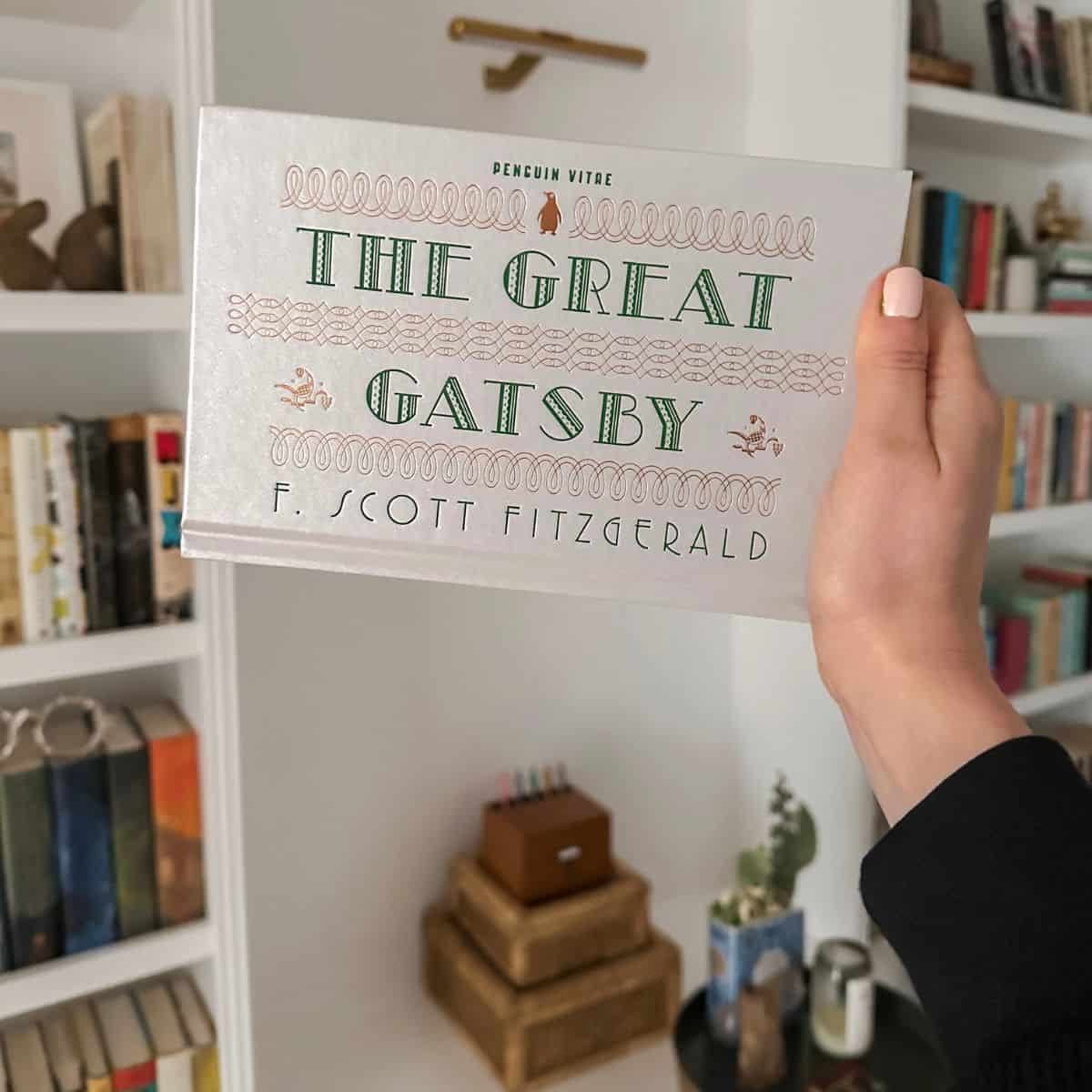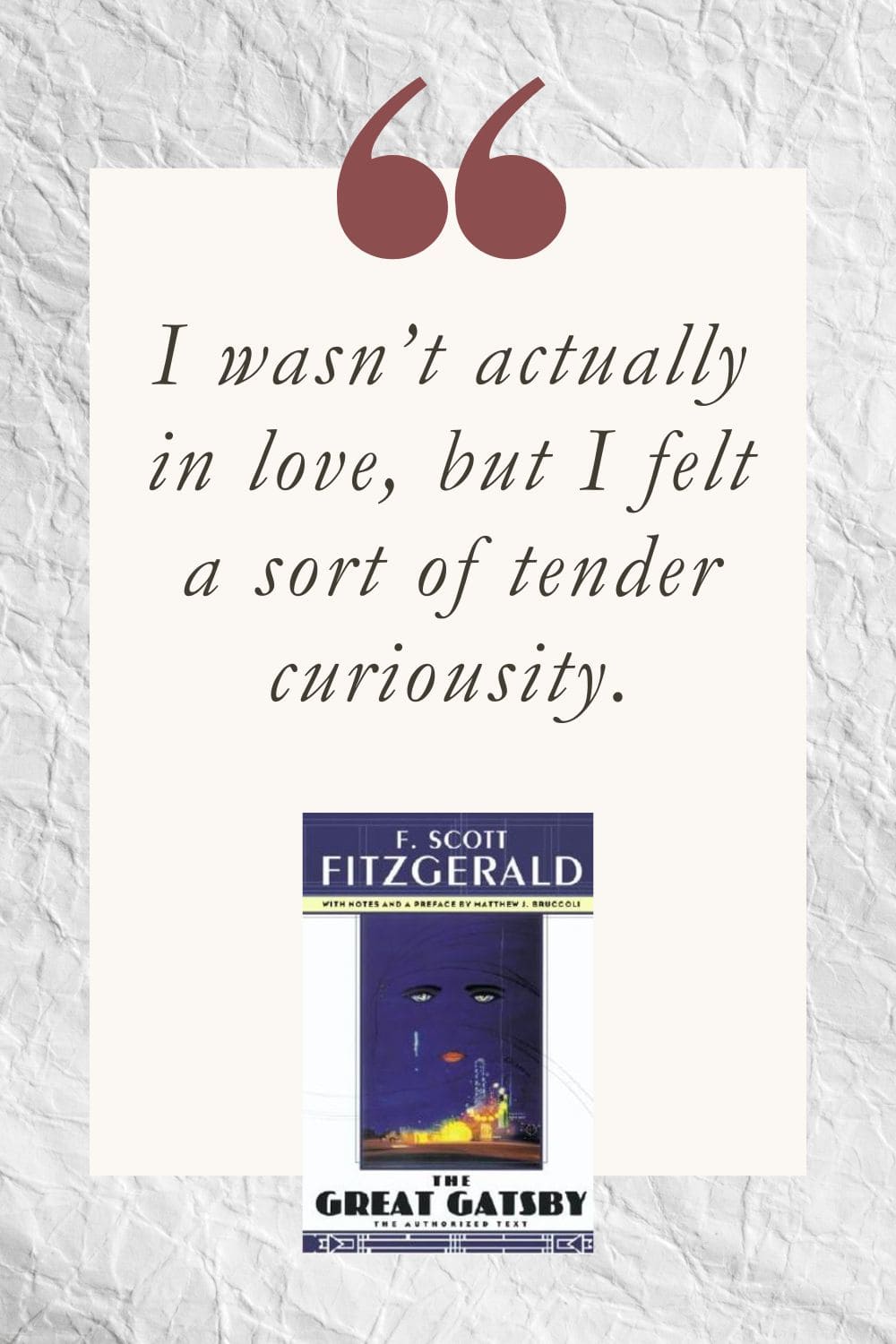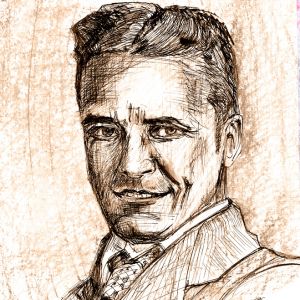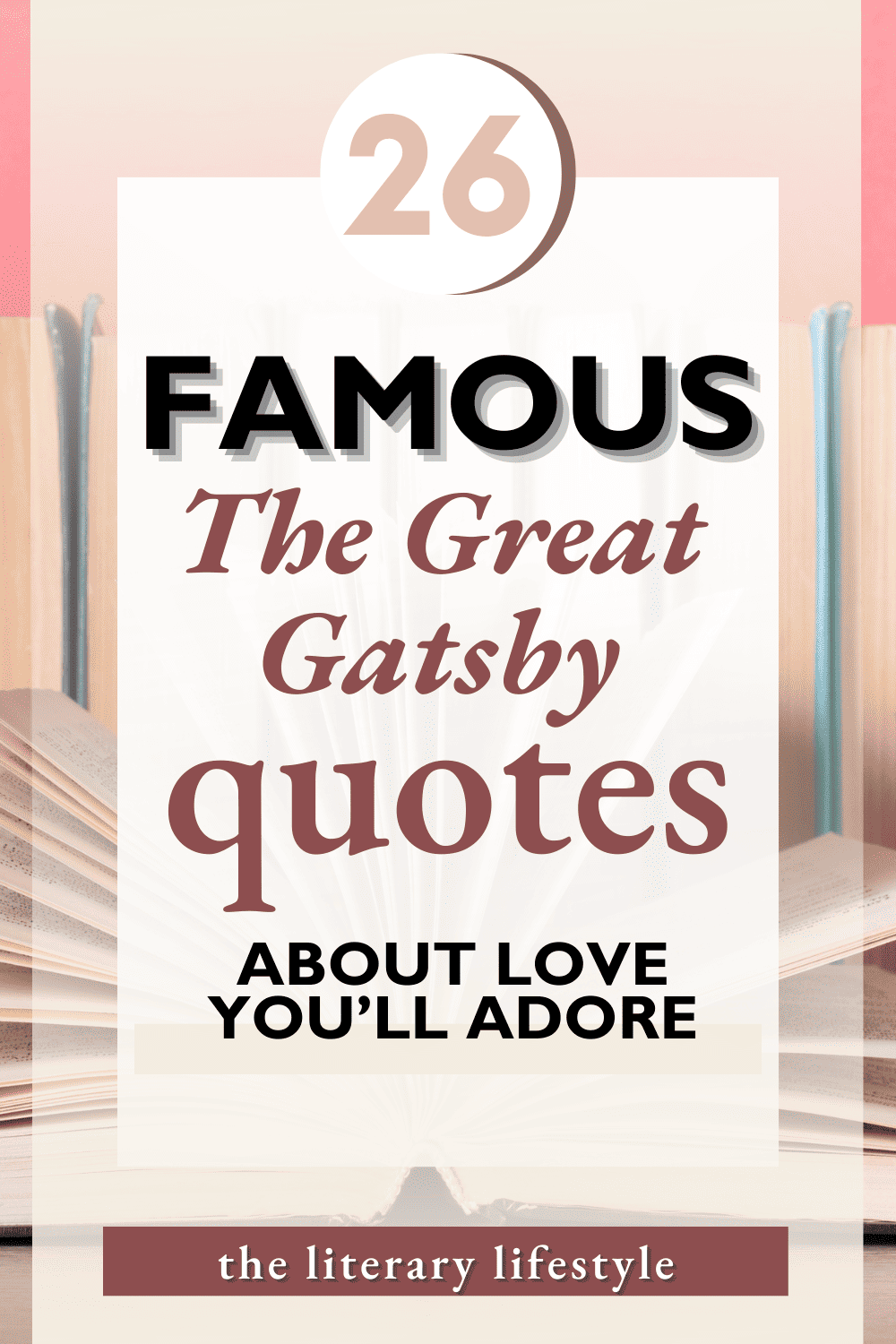Discover the most important The Great Gatsby quotes about love from this easy classic fiction book by F. Scott Fitzgerald. Below are famous lines and details about the author and what love represents in this “Great American Novel.”
You can easily read and use these classic book quotes for academic or personal use, such as essays, presentations, social media posts, a script for a wedding ceremony. Let’s get literary!

The Great Gatsby Quotes About Love, Marriage, and Relationships (With Chapter Numbers)

Note: Since this novel has so many editions, I have annotated their chapter numbers instead of their page numbers. Beware of uncited quotes on the internet for this book, as I have seen incorrect quotes.
“I looked outdoors for a minute, and it’s very romantic outdoors. There’s a bird on the lawn that I think must be a nightingale come over on the Cunard or White Star Line. He is singing away… It’s romantic, isn’t it Tom?” (Chapter 1)
“Her gray, sun-strained eyes stared straight ahead, but she had deliberately shifted our relations, and for a moment I thought I loved her. But I am slow-thinking and full of interior rules that act as brakes on my desires, and I knew that first I had to get myself definitely out of that tangle back home.” (Chapter 3)
“I wasn’t actually in love, but I felt a sort of tender curiosity.” (Chapter 3)
“No amount of fire or freshness can challenge what a man will store up in his ghostly heart.” (Chapter 5)
“The exhilarating ripple of her voice was a wild tonic in the rain.” (Chapter 5)
“But there was a change in Gatsby that was simply confounding. He literally glowed; without a word or a gesture of exultation a new well-being radiated from him and filled the little room.” (Chapter 5)
“He had passed visibly through two states and was entering upon a third. After his embarrassment and his unreasoning joy he was consumed with wonder at her presence. He had been full of the idea so long, dreamed it right through to the end, waited with his teeth set, so to speak, at an inconceivable pitch of intensity. Now, in the reaction, he was running down like an over-wound clock.” (Chapter 5)
“He hadn’t once ceased looking at Daisy and I think he revalued everything in his house according to the measure of response it drew from her well-loved eyes.” (Chapter 5)
“He talked a lot about the past, and I gathered that he wanted to recover something, some idea of himself perhaps, that had gone into loving Daisy.” (Chapter 6)
“He wanted to recover something, some idea of himself perhaps, that had gone into loving Daisy. His life had been confused and disordered since then, but if he could once return to a certain starting place and go over it all slowly, he could find out what that thing was.” (Chapter 6)
“He wanted nothing less of Daisy than that she should go to Tom and say: ‘I never loved you.'” (Chapter 6)
“His heart beat faster and faster as Daisy’s white face came up to his own. He knew that when he kissed this girl, and forever wed his unutterable visions to her perishable breath, his mind would never romp again like the mind of God. So he waited, listening for a moment longer to the tuning fork that had been struck upon a star. Then he kissed her. At his lips’ touch she blossomed like a flower and the incarnation was complete.” (Chapter 6)
“‘Oh, you want too much!’ she cried to Gatsby. ‘I love you now—isn’t that enough?'” (Chapter 7)
“Daisy loved me when she married me and she loves me now.” (Chapter 7)
“Just tell him the truth—that you never loved him—and it’s all wiped out forever.” (Chapter 7)
“As he left the room she got up again and went over to Gatsby and pulled his face down kissing him on the mouth. ‘You know I love you,'” she murmurred.” (Chapter 7)
“And what’s more, I love Daisy too. Once in a while I go off on a spree and make a fool of myself, but I always come back, and in my heart I love her all the time.” (Chapter 7)
“I did love him once—but I loved you too.” (Chapter 7)
“‘Your wife doesn’t love you,’ said Gatsby. ‘She’s never loved you. She loves me.'” (Chapter 7)
“And what’s more, I love Daisy too. Once in a while I go off on a spree and make a fool of myself, but I always come back, and in my heart I love her all the time.” (Chapter 7)
“I can’t describe to you how surprised I was to find out I loved her, old sport. I even hoped for a while that she’d throw me over, but she didn’t, because she was in love with me too… Well, there I was, way off my ambitions, getting deeper in love every minute, and all of a sudden I didn’t care. What was the use of doing great things if I could have a better time telling her what I was going to do?” (Chapter 8)
“It excited him too that many men had already loved Daisy—it increased her value in his eyes. He felt their presence all about the house, pervading the air with the shades and echoes of still vibrant emotions.” (Chapter 8)
“They had never been closer in their month of love nor communicated more profoundly one with another, than when she brushed silent lips against his coat’s shoulder or when he touched the end of her fingers, gently, as though she were asleep.” (Chapter 8)
“She wanted her life shaped now, immediately—and the decision must be made by some force—of love, of money, of unquestionable practicality—that was close at hand.” (Chapter 8)
“Angry, and half in love with her, and tremendously sorry, I turned away.” (Chapter 9)
Unraveling The Theme of Love In The Great Gatsby
The Great Gatsby is a classic love story of the unrequited love that the wealthy East-coaster Jay Gatsby has for his former flame, Daisy Buchanan. He struggles to transcend the past, and his story is told through the eyes of a naive Midwesterner aspiring to the American Dream.
The short classic novel explores many types of love in the setting of 1920s New York, a time and place when money and excess were important to people.
The themes of love the reader explores in The Great Gatsby include:
- romantic love
- unrequited love
- the idealization of love
- the intersection between love and the American Dream
- the all-consuming nature of love
- how love and fate collide
Indeed, love drives the plot forward and affects the characters’ fates in this character-driven novel. These characters and their relationship statuses are:
- Jay Gatsby: a wealthy single man focused on rekindling a prior relationship, driven by money and status
- Daisy Buchanan: a married woman who was Jay Gatsby’s former fling and his current love interest
- Tom Buchanan: Daisy’s husband
- Nick Carraway: an outside observer who narrates the novel’s love triangle
In The Great Gatsby, Jay Gatsby is motivated by his love for Daisy because it fuels his pursuit of wealth and social status. His desire to rekindle their past romance shows love’s all-consuming power in shaping one’s dreams.
Ultimately, The Great Gatsby shows the destructive nature of unrequited love. It’s an ill-fated story of a man who loses himself trying to rekindle a relationship with a married woman. He is motivated, in great part, by her money and the lifestyle she represents.
READING TIPS
If you’re looking to pair this book with an adaptation, the 2013 adaptation of The Great Gatsby starring Leonardo DiCaprio is very well done, with lots of glittering eye candy! And, if you want to immerse yourself in an audio version, Audible has one that’s read well by actor Jake Gyllenhaal. (It was an Audie Award Finalist.)
About Author F. Scott Fitzgerald
about

F. Scott Fitzgerald (1896-1940) was a famous American novelist, fiction writer, and essayist. His work was heavily influenced by the themes of the Jazz Age, including material wealth and social status, as well as his wife, Zelda Fitzgerald.
Fitzgerald was also known for being part of the Lost Generation, a group of disillusioned American expatriate writers in Europe after World War I, including Ernest Hemingway.
Published in 1925, The Great Gatsby is often considered to be the “Great American Novel.” Also noteworthy is Fitzgerald’s final novel, 1934’s Tender is the Night.
Learn more at the F. Scott Fitzgerald Society.
More Quotes From The Great Gatsby
If you liked these literary love quotes, you will love these posts:


